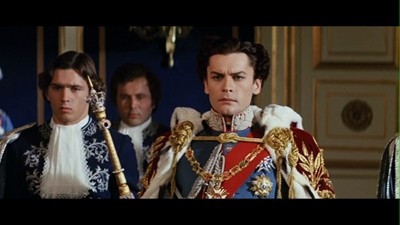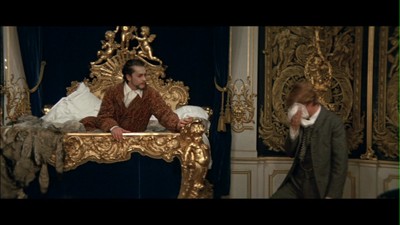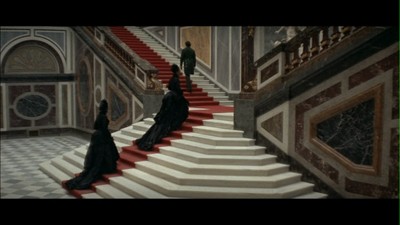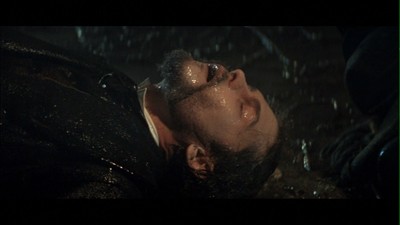| Reviews & Columns |
|
Reviews DVD TV on DVD Blu-ray 4K UHD International DVDs In Theaters Reviews by Studio Video Games Features Collector Series DVDs Easter Egg Database Interviews DVD Talk Radio Feature Articles Columns Anime Talk DVD Savant Horror DVDs The M.O.D. Squad Art House HD Talk Silent DVD
|
DVD Talk Forum |
|
|
| Resources |
|
DVD Price Search Customer Service #'s RCE Info Links |
|
Columns
|
|
|
Ludwig
THE MOVIE:

Luchino Visconti's 1972 film Ludwig is an example of a biopic done as an epic, a grand and opulent study of the life of the 19th-century "mad kind of Bavaria," Ludwig II. A member of the Italian aristocracy himself, Visconti stood apart from his filmmaking contemporaries and their embracing of Neorealism, instead crafting meticulous studies of the various classes that were almost more realistic in their painstaking attention to detail but at the same time created a feeling of another world. This feeling of disconnection went hand in hand with the themes of many of the director's pictures, where his characters were often at odds with the world around them and seemed to walk rarefied streets that had little in common with the spaces they connected. Thus, we get Marcello Mastroianni's lonely romantic traversing bridges and canals in Le notti bianche or Burt Lancaster's patriarch in The Leopard, a symbol of a passing age.
Lancaster's aging nobleman actually has a lot in common with Ludwig II. As played by Helmut Berger (The Garden of the Finzi-Continis), this monarch has little connection to the kingdom he rules. Through most of Visconti's four-hour portrait, King Ludwig is indoors, locked away in his opulent estates. He is not part of the lives that he governs, but instead is informed of what is going on by various aides and courtly officials. A dreamy young man crowned in his teens, it is assumed that Ludwig is unschooled in all things, and much of the first half of the picture (split here between two DVDs) is about the King's education in matters of love, war, and sex. By the end, Ludwig begins to tire of these conspiracies, even tossing out the prostitute his counsel hires to teach him how to be a lover before she can earn her money.
Ludwig's one respite is sneaking out at night and riding his horse under the stars. This is where onlookers begin to suspect him of madness, as apparently this quest for solitude was considered strange behavior back then. He finds some comfort in the fact that his cousin Elisabeth, the Empress of Austria (Romy Schneider, who also played the Empress at a younger age in the Sissi trilogy fifteen years earlier), engages in similar activity, and she joins him for a few moonlight rides. Of course, he has also fallen in love with this independent woman, who seems to enjoy the freedom he does not, and his pining for her postpones any serious hunt for a wife and causes further rumblings of his state of mind. So, too, does his harboring of Richard Wagner (Trevor Howard, Brief Encounter), the composer, whose music Ludwig adores but whose personal life and money grubbing ends up being an embarrassment to his sponsor.
Like most of Visconti's dramas, Ludwig has a leisurely storytelling style that adds to the feeling of serious contemplation the film requires and is also successful in creating that sense of another world that is essential to understanding his outsider characters. The director is not hurried in his portrayals, but rather able to document the ennui with a pacing that is akin to real time, the languorous dialogue scenes showing a lack of urgency in Ludwig's life. Even discussions of war seem protracted and separate, with Ludwig having no idea what the frontlines are like and not understanding why his younger brother, Prince Otto (John Moulder-Brown), can't merely abandon his duty.
In the case of Ludwig, the longer running time also allows Visconti to avoid the compression of time that hobbles so many biography movies. There is no rush to cram everything in, Visconti can take his time. The first half of the picture begins with Ludwig's coronation and ends in the midst of his engagement to Tsarina Sophie (Sonia Petrovna), whom Elisabeth has chosen for the King. The second half looks at Ludwig's later years and his being deposed. Visconti also cuts interviews with members of Ludwig's cabinet into the action, with the noblemen talking directly to the camera to explain some of the interpretations of the King's behavior and the scandals that dogged him. It's not a device that Visconti labors over, but it certainly prefigures the fake documentary style that would become popular decades later.

Of course, that longer running time can be a fault as much as it is a virtue, and the second half of the film does drag, particularly in its first hour when Ludwig disappears into his obsessions and instead of trying to break free into the outer world, locks himself away from it. The King continues to pursue a love of the performing arts, including inviting an actor he admires (Folker Bohnet) back to his home and trying to make him his personal performer the way he wanted Wagner to be his personal composer. Ludwig also builds a continuous string of ever-opulent palaces, one after the other, most of them left to sit idle as soon as he moves on to the next. (Visconti shows these in exacting detail when Elisabeth takes a tour of them. These scenes were shot on location, but special praise should also be reserved for production designers Mario Chiari and Mario Scisci.) In his exile, he cavorts with young boys and lets his health deteriorate. By the end, he is a pale shell of himself, his teeth rotting along with his brain. Helmut Berger, who bares both a passing physical resemblance to Alain Delon as well as the actor's icy demeanor, really distinguishes himself in these scenes, imbuing his performance with a brittle incredulity that is both childish and sad. Throughout Ludwig, he comes off as a monarch that is more tolerated than followed, which contrasts well with Schneider's portrayal of Empress Elisabeth as a woman always in charge. Her manipulation and domination of her troubled cousin is quite impressive.
In this period, Ludwig is not at all concerned with governance, which eventually attracts the notice of the ruling officials. At this juncture, the "documentary" interviews meld with the narrative as we realize that they are part of an inquiry into Ludwig's mental health. The investigation leads to a political coup, and here the film begins to pick up again as the various conspiracies to remove the King from his throne and to protect him intersect. Multiple doctors diagnose Ludwig as paranoid, so imagine what it must be like when, shortly after being imprisoned/hospitalized, he discovers the peepholes in the wall where his enemies spy on him--he may be paranoid, but they have really come after him! In this last act, the early hints of Ludwig's eccentricities being calculated and voluntary start to have some bearing. (One aide, Count Duerckheim, played by Helmut Griem, even says as much.) Ludwig may also be truly mad, it's an unanswerable question, and one that Visconti isn't too rigorous about pursuing; rather, as King Ludwig II accepts his fate, he joins other Visconti protagonists in acknowledging the passing of his time on top. The King seems to realize that it's over for him, that the world can no longer tolerate his passions, and that it will continue to turn without him. (He would be pleased to know that Wagner's music still endures, I am sure.)
A film with the scope and patience of Ludwig certainly requires as much patience from its audience, but there are few directors that can guide his viewers through the grandeur of this kind of lifestyle the way Luchino Visconti can. While other filmmakers would be drawn to monarchs who distinguished themselves in battle or effected greater social change, Visconti is more fascinated with a ruler who felt trapped by his position and yearned to be a part of the larger tableau of music and art. For him, Ludwig was more important for how his heart was broken by beauty than for how he lost his country. With sumptuous set designs and well-tailored performances from the distinguished cast, Ludwig takes us behind palace walls to view the fragility that is often secured inside them.

THE DVD
Video:
Ludwig was shot at the very wide 2.35:1 aspect ratio, which is preserved here in a solid 16X9 transfer. The image quality is mostly pretty good, with decent color values as well as good blacks. The look of the picture was not very bright originally, and the film stock of the early 1970s is represented in the DVD image's muted palette. I didn't notice too much by way of digital combing or anything of that nature though there is some), but there was an occasional flash of a yellow line at the lower edge of the image, and given that it appeared just above the subtitles, may have been related to those.
There is a rather harsh layer shift on disc 1 during chapter 13, just after Ludwig has dropped the prostitute into the bath and she is swimming out (there are 14 chapters on that disc). A much less obtrusive shift occurs on DVD 2, at the outset of the chapter 12, and is conveniently located at a scene break. There are a couple of other hiccups on the second disc, however, including a jarring cut to black in chapter 13 that seems too abrupt to be intentional.
Sound:
The original Italian soundtrack is given a Dolby monaural mix here, and it's fairly good. The tones are occasionally a little flat, but there are no odd sounds or signs of hiss. The removable English subtitles are rendered in yellow and move at a natural pace that is easy to follow.
Regular viewers of Italian cinema also won't be surprised by the fact that the international cast spoke in many different languages on set and then were dubbed into Italian in post-production. So, if the words don't match the lips, that's the nature of the production and not a fault in the DVD.
Extras:
The film is split across two discs, and they also have their own extras. All of the bonus features are in Italian with English subtitles.
DVD 1 has two features, a profile of actress Silvano Mangano (Richard Wagner's mistress in the film) that runs a little over half an hour and an interview with costume designer Piero Tosi. The Mangano documentary, "The Scent of Primroses," chronicles how the dancer became an actress, starting with bit parts in 1947 and continuing on to greater success and fame, regular work with Visconti and Pasolini, and a troubled family life. We get a generous helping of clips from even the earliest films, as well as interviews from many of her friends and admirers, including Piero Tosi. The Tosi interview is nearly an hour long and covers his entire career, including working with Visconti and Fellini, and though interesting, it's a little disappointing that there are no examples of the man's art and designs. It's a one-camera situation, just Tosi sitting in a chair and talking, none of the costumes that earned him his reputation.

DVD 2 has a documentary about Luchino Visconti called "Life as in a Romance." This 55-minute film covers the director's biography, from his early life and into his expressions in music, the stage, and film. Illustrated with clips from his films, words from the director himself, and interviews with collaborators and peers, including Burt Lancaster, Marcello Mastroianni, and Franco Zeffirelli, this detailed piece explores how his noble beginnings and political leanings fueled later work, including the dichotomy in his ability to portray the rich and the poor alike.
From what I've been able to gather, these features were also on the European versions of Ludwig, and this release appears to be a fairly direct port of those. The Koch Lorber release is packed in a folding book with cardboard covers and two plastic trays on the interior, and it slides into an outer slipcase.
FINAL THOUGHTS:
Ludwig is Recommended, though only for film fans who know how to sit still for extended periods of time. This four-hour biography of Ludwig II of Bavaria is a masterfully executed historical epic from Italian director Luchino Visconti, one that matches the excessive interiors of the mad king's castles to the troubled interiors of his mind. With excellent performances by Helmut Berger in the lead and Romy Schneider as the King's cousin, an empress with similar anxieties over her lot in life, Ludwig explores the turmoil that arises when one's duty conflicts with one's desires. One could argue that Visconti succumbs the same obsessive nature as his subject, lingering a little too long on some details, but he never loses sight of the story underneath and has no trouble segueing from the cataloging of Ludwig's madness into the tragic finale.

Jamie S. Rich is a novelist and comic book writer. He is best known for his collaborations with Joelle Jones, including the hardboiled crime comic book You Have Killed Me, the challenging romance 12 Reasons Why I Love Her, and the 2007 prose novel Have You Seen the Horizon Lately?, for which Jones did the cover. All three were published by Oni Press. His most recent projects include the futuristic romance A Boy and a Girl with Natalie Nourigat; Archer Coe and the Thousand Natural Shocks, a loopy crime tale drawn by Dan Christensen; and the horror miniseries Madame Frankenstein, a collaboration with Megan Levens. Follow Rich's blog at Confessions123.com.
|
| Popular Reviews |
| Sponsored Links |
|
|
| Sponsored Links |
|
|
| Release List | Reviews | Shop | Newsletter | Forum | DVD Giveaways | Blu-Ray | Advertise |
|
Copyright 2024 DVDTalk.com All Rights Reserved. Legal Info, Privacy Policy, Terms of Use,
Manage Preferences,
Your Privacy Choices | |||||||














